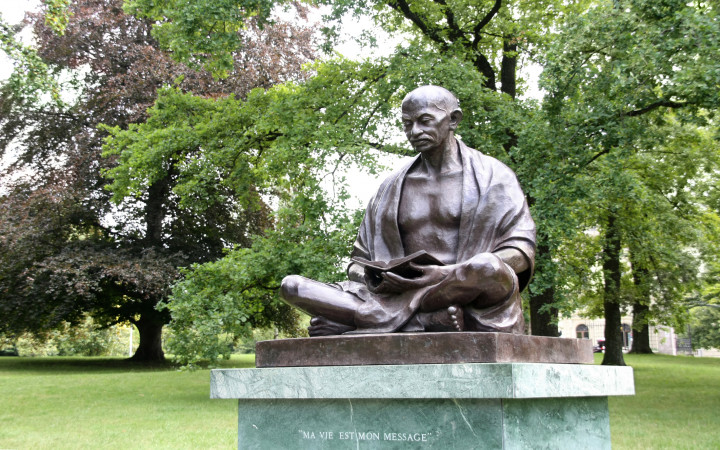Today’s Wonder of the Day was inspired by Ruth. Ruth Wonders, “Who is Gandhi?” Thanks for WONDERing with us, Ruth!
Have you ever had to follow a rule that wasn’t fair? What did you do? Some people react to unfair rules by breaking them. Others follow the rule to avoid rocking the boat. When a rule is so unfair that following it feels wrong, we can learn a lot from Mahatma Gandhi.
Mahatma Gandhi was a lawyer and social activist. He was born in India in 1869. His birth name was Mohandas. but today we call him “Mahatma” (meaning “Great Soul”).
As a child, Gandhi went to school, as you do. However, Gandhi’s school didn’t have tools like pencils and paper. Instead, Gandhi learned to write by drawing letters in the dirt. Despite this, he later went to college and earned a law degree.
After college, Gandhi moved to South Africa. At that time, Britain ruled South Africa. There, he experienced discrimination because of his race. People were often unkind to him. The government had also made laws that discriminated against non-white people. The nation’s policy of segregation, called Apartheid, was still in place. Some parts of the country even planned to stop Indian citizens from voting.
Gandhi wanted to end these unfair laws. In 1894, he started the Natal Indian Congress. This group worked to fix the wrongs done to Indian people in South Africa. They practiced civil disobedience, a form of protest. Civil disobedience is when people don’t follow an unfair law. Eventually, the government gave in. It took steps to end Indian discrimination in 1913.
In 1915, Gandhi went back to India. South Africa had gained independence from Britain in 1910, but India was still under Britain’s rule. Gandhi led nonviolent protests against the British government. He became a top political figure.
Gandhi’s first action was to organize the Salt March. This was in response to Britain’s Salt Acts, which made it illegal for Indians to collect or sell salt. On the Salt March, Indians walked 240 miles (390 kilometers) to the Arabian Sea. The march started with a few dozen people. It grew to tens of thousands by its end. When they reached the sea, Gandhi made salt from seawater, which broke the law.
The government arrested 60,000 people after the Salt March. Nonviolent protests continued until India won independence from Britain in 1947. Gandhi was arrested many times. Not once did he use violence against his enemies.
Gandhi has been called the “Father of India,” for his actions. His use of nonviolence inspired people all over the world. Despite this, Gandhi’s life ended violently. He was assassinated in 1948 while walking to a prayer meeting.
Mahatma Gandhi’s legacy lives on today. He inspired civil rights leaders like Martin Luther King, Jr. and Nelson Mandela. People everywhere know who Gandhi was, and many follow his example. What will you do the next time you‘re faced with an unfair rule? What forms of nonviolent protest can you think of?
Standards: C3.D2.Civ.12, C3.D2.Civ.14, C3.D2.His.3, C3.D2.His.14, CCRA.L.3, CCRA.L.6, CCRA.R.1, CCRA.R.2, CCRA.R.4, CCRA.R.10, CCRA.W.3, CCRA.W.7, CCRA.W.8, CCRA.SL.1, CCRA.L.1, CCRA.L.2, CCRA.L.4, CCRA.L.5




